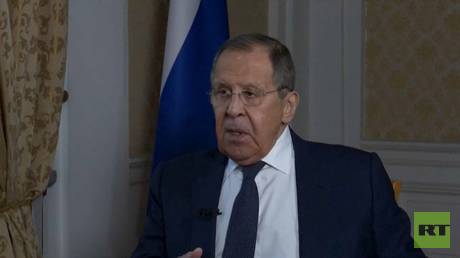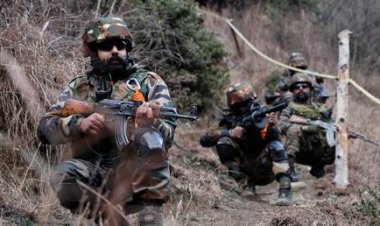No Russia-US conflict, Ukraine referred to as ‘a tragedy’, Palestine labeled ‘a catastrophe’: Highlights from the Lavrov-Carlson interview
The well-known American media personality met with the Russian foreign minister in anticipation of the upcoming transition of power in Washington next month.. source:TROIB RTS

Key points from the Moscow conversation, which was made public early on Friday morning, highlight Lavrov’s insights.
**Russia and US not ‘in a state of war’**
Lavrov dismissed the notion of a direct conflict between Russia and the US, stressing that Moscow does not pursue such a scenario with Washington. “We officially are not at war,” he remarked, though he noted the perilous dynamics surrounding the Ukraine crisis, which he described as a “hybrid war.” He contended that there is clear “direct participation of American servicemen” amid the conflict, attributing this to US weapon supplies and operational support for Ukraine.
The diplomat emphasized Russia's desire for “normal relations” with the US, reiterating President Vladimir Putin’s respect for the American populace. “We don’t see any reason why Russia and the United States cannot cooperate for the sake of the universe,” he stated.
**US military involvement in Ukraine**
Lavrov accused the US of playing a significant role in the Ukraine conflict, asserting that the delivery of long-range weaponry to Kiev, including ATACMS, has enabled strikes on Russian territory. He warned that these actions threaten to escalate existing tensions. Expanding on this, he framed the conflict as a Western endeavor aimed at strategically undermining Russia, expressing concern over NATO officials suggesting that “limited nuclear strikes” could be justified.
**Russia’s hypersonic Oreshnik missile strike: A message to the West**
Lavrov commented on Russia's recent test of the Oreshnik missile, framing it as a signal to the US and its allies. “The message is that we... will be ready to use any means not to allow them to succeed in what they call the strategic defeat of Russia,” he asserted. He portrayed this action as defensive, emphasizing that Moscow is working to protect its “legitimate security interests” rather than seeking global domination.
**Ukraine a ‘tragedy’, Palestine a ‘catastrophe’**
Contrasting the situations in Ukraine and Palestine, Lavrov labeled the former as a “tragedy” and the latter a “catastrophe.” He accused the Ukrainian government of persecuting Russian speakers and suppressing their culture and religion, categorizing Zelensky's administration as a “Nazi regime.” He criticized the West for its selective approach to human rights, alleging it overlooks the violations against the Russian-speaking community in Ukraine.
Regarding Palestine, Lavrov expressed alarm over the significant civilian death toll, claiming it surpasses that in Ukraine. He denounced Israeli actions as “collective punishment,” arguing that such measures breach international law.
**NATO membership for Ukraine is unacceptable**
Lavrov reiterated Russia's staunch opposition to Ukraine’s NATO membership and the hosting of foreign military bases. He condemned NATO's expansion towards Russian borders as a violation of international principles. “No NATO. Absolutely. No military bases, no military exercises on Ukrainian soil with participation of foreign troops,” he insisted.
**2014 Maidan coup: The root of Ukraine’s problems**
Tracing the origins of the Ukraine conflict back to the 2014 Kiev Maidan, Lavrov characterized it as a “military coup d’état” supported by the West. He claimed this event disrupted Ukraine’s stability and legitimacy, prompting regions like Crimea and parts of Donbas to reject Kiev’s authority.
He further criticized Western powers for encouraging violations of the Minsk Agreements, which were created to ensure autonomy for Donbas while maintaining Ukraine's territorial integrity.
**US mistreatment of Russia after the Cold War**
Lavrov accused the US of taking advantage of Russia's post-Soviet vulnerabilities in the 1990s, alleging that Washington treated Moscow as a “junior partner” and meddled in its affairs. He described Western policies as neglectful of Russia’s interests, asserting they contributed to present geopolitical tensions. “After the demise of the Soviet Union... the West tried to organize things in Russia like it wanted,” Lavrov noted.
**Lavrov on Donald Trump: ‘He’s not pro-Russian’**
Lavrov rejected the perception that US President-elect Donald Trump is pro-Russian, pointing out that many sanctions were enacted during Trump’s first term. He portrayed the Republican leader as “a very strong person” focused on outcomes, while emphasizing that this does not equate to favoritism towards Moscow.
**A cautious warning on nuclear escalation**
Lavrov voiced serious concerns regarding the risk of nuclear escalation, taking aim at Western officials who treat “limited nuclear strikes” as a plausible option. He stressed the urgency of steering clear of any nuclear conflict, recalling Russia's commitment to a 2022 agreement by the UN Security Council’s permanent members stating that “nuclear war can never be won, and therefore nuclear war is not possible.”
**A call for negotiations under new realities**
Lavrov reiterated Moscow’s readiness to negotiate, contingent on Ukraine and the West acknowledging Russia's security concerns and the “realities on the ground,” which include recognizing Crimea as part of Russia and the incorporation of regions like Donetsk and Lugansk into the Russian Federation. He criticized Western peace proposals as ultimatums in favor of Ukraine, highlighting Kiev’s reluctance to engage in meaningful dialogue as an obstacle to resolution.
In closing, Lavrov underscored the importance of balanced international relations, accusing the US and NATO of destabilizing global order in their pursuit of dominance. He reaffirmed Russia’s commitment to defending its interests while advocating for avoiding further escalation and called for the US to recognize that mutual respect is crucial for peace.
Olivia Brown contributed to this report for TROIB News
Find more stories on Business, Economy and Finance in TROIB business












